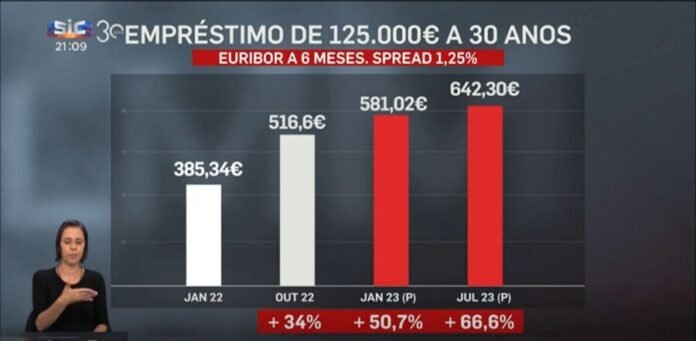Catarina Martins speaks on a day marked by political announcements from ” marmot”
In another day where the government is re-issuing policies it previously announced as if they were new, Bloco de Esquerda warned of ‘big risks’ and ‘hopes everything will be fine’ for families facing staggering mortgage loan increases.
Prime Minister António Costa gave another of his upbeat speeches this morning about how he expects banks to “negotiate” around any problems customers may encounter.
The effect of rising interest rates on mortgage payments should not be allowed to become a drama he said.
Which is very commendable, but also terrifyingly open. What if banks’ ideas about “negotiation” didn’t match their customers’ responsiveness? Or what if the banks do not show the “goodwill” that Mr. Costa expects from them?
Catarina Martins believes that a legal obligation should be introduced obliging banks to renegotiate all their mortgage contracts. Some sort of “guarantee” imposed so families know they are protected.
She told reporters today: “Waiting to see if the banks will find a solution is a huge risk for the country. It’s leaving families who are already in such a difficult situation (…) Unless people have forgotten, have the banks never bothered to create housing crises. What we have learned from the past is that when there is a housing crisis, families lose their homes – and the banks wait for the taxpayers to bail them out…”.
To ensure none of this happens again, “just as spreads were raised when interest rates fell, banks should now be forced to lower spreads and renegotiate other terms, such as grace periods for example”, to ensure no one loses their home . .
To be fair, the Prime Minister said: We will approve a law that promotes negotiation and eliminates the costs associated with this negotiation”. What BE seems to be saying is that the law must REQUIRE negotiation and don’t just favor it.
Otherwise, it has been a strange day to reinstate public sector pay rises, which remain the same as when they were first announced – and still cannot reasonably keep pace with the rising cost of living.
With the PS director’s spending plan for next year due to be debated in parliament on Thursday and Friday, the government appears determined to win “good press” ahead of what risks a political bloodbath.
The beer industry is already desperately trying to get concessions before the budget is set in stone; gas suppliers also say they will be forced out of business if the government does not lift the ceiling on the prices it can charge; teachers warn of another strike; public servants have set 18 November as a national strike day – and experts and commentators warn that there will be a “social accident” unless a new package of measures to help the most vulnerable is quickly introduced: if not now, the measures must be in place at the start of the new year warned TV commentator Luís Marques Mendes last night.
How high should mortgage lending rise?
Luís Marques Mendes presented a graph last night (see image above) on SIC’s Jornal de Noite to show expected mortgage increases over the next few months, prepared by DECO protests with input from one of the national banks.
He described the image as “terrifying”: an average loan of €120,000 over 30 years is expected to increase by more than 66% compared to what was paid in January of next July.
In other words, customers paying around €400 per month in January 2022, should have a refund of more than €640 per month in July 2023.
Already this month, installments on mortgage loans in the home loan phase of approx. €120,000 increased by 34%, he said.
“It’s really scary (…) These climbs are brutal. Although we currently have a situation of “full employment” – meaning that the outlook is much more positive than during the Troika era (after the 2008 financial crisis), the measures announced by the government so far are clearly insufficient (…) More concrete support is needed for people repaying mortgages,” he said – recalling that the long-term rental sector has been “protected” by a rent freeze, where landlords receive financial compensation through their IRS; the is only reasonable to ensure that the mortgage industry receives similar treatment.
Today it is all “problems” that are talked about in the press. By Thursday in Parliament at the latest, they will become real points of contention as opposition parties push for a national budget that is far more ambitious and provides more insurance for individuals and families currently suffering from rising living costs.
natasha.donn@portugalresident.com
